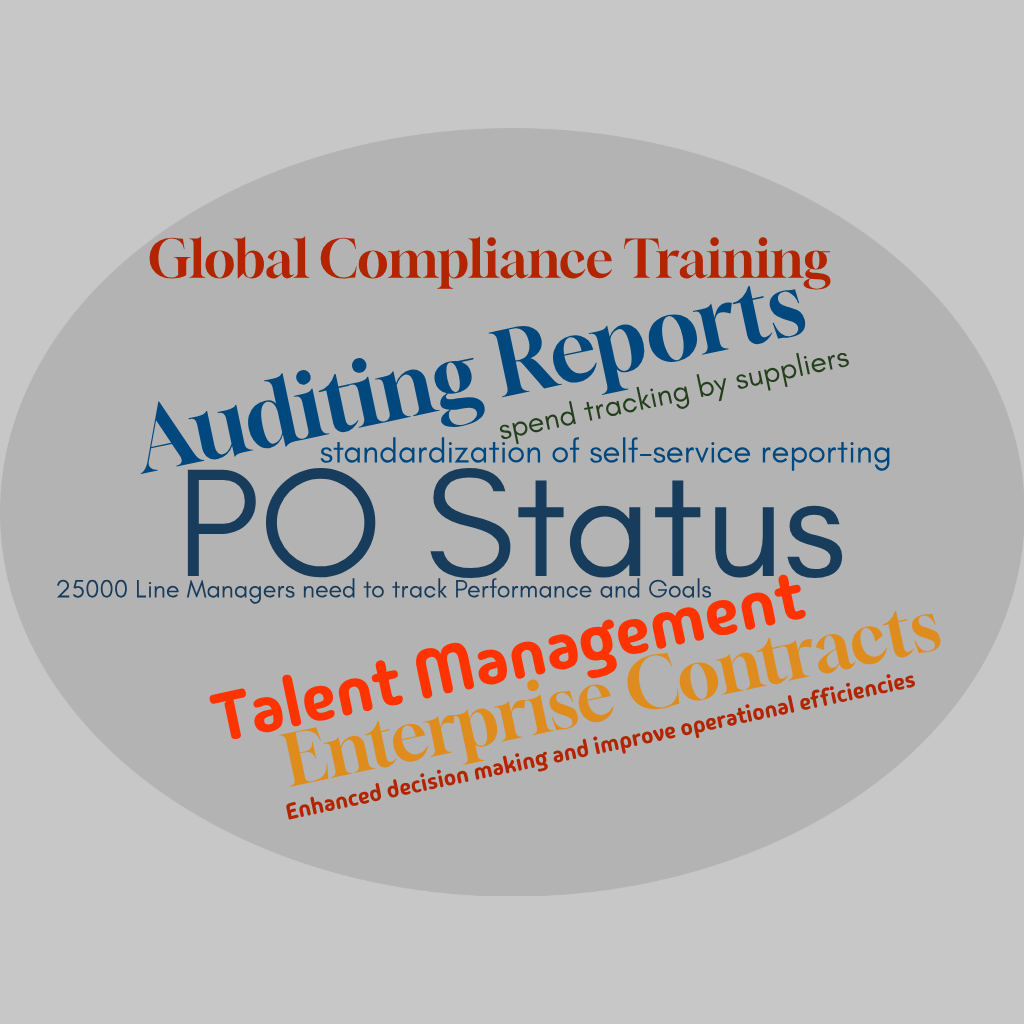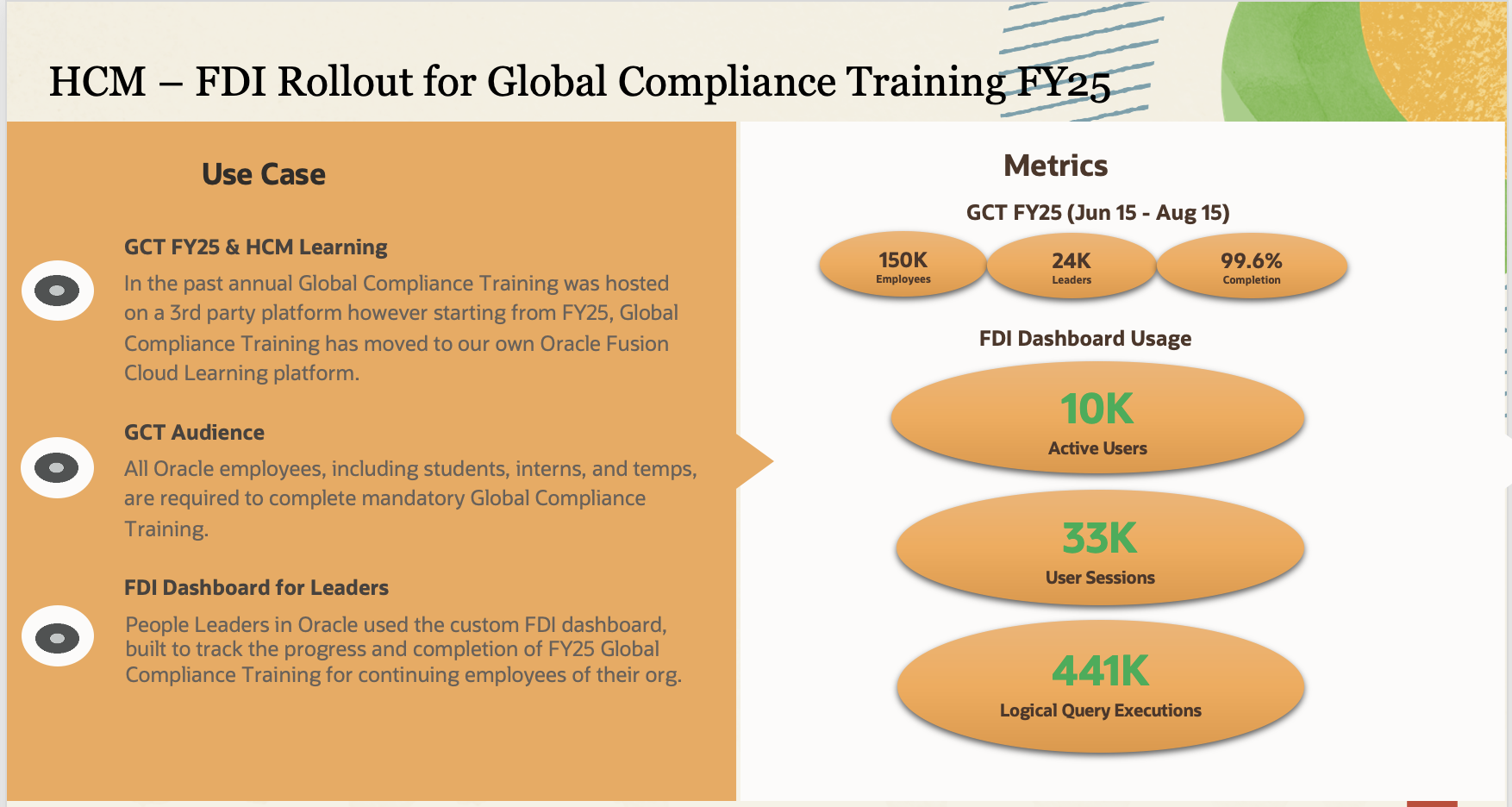FDI: Driving Organizational Success At Oracle Through Internal Rollout
A Case Study in Leveraging Internal Adoption for Scalable Impact
Oracle Fusion Data Intelligence (FDI) is a family of prebuilt, cloud-native analytics applications for Oracle Fusion Cloud Applications that provide ready-to-use insights to help you improve decision-making. It is extensible and customizable, allowing your organization to ingest data and expand the base semantic model with additional content.
Successfully launching FDI within Oracle is a critical milestone—not only validating the product’s effectiveness but also laying the foundation for broader market credibility. After all, there’s no better endorsement than using it in our own backyard.
This article series walks you through the evangelization of FDI within Oracle (FDI@Oracle) to achieve measurable efficiency gains, increased user satisfaction, and a strong internal proof point to accelerate external customer adoption.
Introduction
Many organizations underestimate the strategic advantage of being their own first customer. Internal deployments provide immediate, authentic feedback, enable rapid iteration, and create proven success stories before scaling to the market. At Oracle, various teams are leveraging the internal rollout of FDI to strengthen the company’s data-driven culture, refine our solution in real time, and build momentum that fuels broader market adoption.
Objectives of FDI Rollout
The internal product rollout aims to achieve these four core objectives:
- Validate Real-World Usability
Test product performance under real operational conditions. - Gather Actionable Feedback
Collect feedback to refine product features and user experience. - Drive Adoption Across Functions
Encourage cross-departmental use to break down silos. - Establish a Scalable Success Story
Use internal success as a catalyst for external adoption.

Implementation Strategy
A rollout of this scale requires meticulous planning, disciplined execution, and continuous adaptation. The objective is to adopt features and functionalities progressively guided by best practices outlined in the Implementation Guide
Below is the current strategy, which the core team will closely monitor and refine throughout the implementation journey.
1. Planning & Stakeholder Alignment
- Formed a cross-functional rollout team (core team)
- Aligned on a phased rollout approach
- Identified key use cases and prioritized them
- Defined success metrics
- Secured executive sponsorship and internal champions
2. Pilot Launch
- Initiated rollouts with a small target audience
- Conducted onboarding and enablement sessions
- Executed User Acceptance Testing (UAT) sessions
3. Usability and Performance
- Established mechanisms for early feedback collection
- Monitor and address usability concerns
- Performance is key! Planned load and dashboard performance testing
4. Deployment
- Roll out to all intended users across departments
- Integrated training into regular team meetings and workflows
- Established dedicated support channels and internal knowledge bases
5. Continuous Improvement
- Launch structured feedback loops (e.g., surveys, user interviews)
- Prioritized iterative updates based on user feedback and usage data
- Hold regular internal reviews to assess progress and impact
- Monitor performance metrics and key success indicators
The Rollout(s) Journey
While each rollout is a well-planned effort that brings in various stakeholders from different organizations, here are the highlights:
People Leaders Tracking Compliance Training with FDI@Oracle
During a general planning session, the Global Operations Head of HCM Systems at Oracle casually asked, “Hey, I have a business need—can we build something to help managers track compliance learning?” The core team said yes—without realizing the full scale of what was coming: a rollout to 25,000 managers across Oracle in just five weeks!
Curious how our core team pulled it off?

Performance Management with FDI@Oracle
Following the successful launch of the Compliance Training Dashboards across the organization, the next rollout was a natural progression. What better way to extend the impact than by using FDI to track and analyze how People Leaders are supporting their employees through the performance management cycle?
Watch this space as our core team details some of our journeys within our enterprise driving success with FDI@Oracle
Summary
The success of this initiative has been more than just technical—it’s been cultural. FDI is no longer just a product; it’s a problem-solving engine, now being used at scale within Oracle.
Naturally, momentum is building. We’re now exploring multiple parallel initiatives, each unlocking new use cases and expanding impact.
The result? A living proof of concept that not only validates the product’s effectiveness but also lays the foundation for broader market credibility.
After all, what better way to show the world its value than by starting at home?
Watch out for child FDI@Oracle articles as we spotlight on some of these rollouts.
